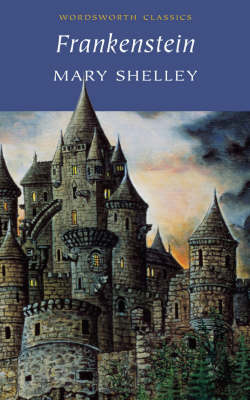
If you were to take a random poll asking people what comes to mind when they think of "Frankenstein", they'll probably tell you that they envision a green monster with bolts in his neck moaning like a zombie while a crazy-haired scientist shrieks, "It's alive!" and a hunchback named Igor looks on. This is a great summary of most Frankenstein movies. Fortunately, Mary Shelley's book Frankenstein has none of these elements and is all the better for it.
The basic plot of Frankenstein will be familiar to most people, even if they're unaware that there is a book about Frankenstein. A brilliant doctor (named Frankenstein) creates a hideously ugly creature. The creature then begins terrorizing the good doctor and creates a tremendous amount of mayhem and horror in the process. What sets Frankenstein the book heads and shoulders above Frankenstein movies is the portrayal of the creature. Instead of a dumb, lumbering brute, the creature is an extremely intelligent, articulate, inquisitive, kind, and sensitive being who appreciates nature and literature. His better qualities make him an even more frightening villain once his anger at Dr. Frankenstein (for creating and then abandoning him) is unleashed. Victor Frankenstein also emerges as a more complex and flawed character. Intelligent and basically decent, he eventually realizes his error in creating the monster. Initially, I greatly sympathized with the creature, but as he wrecked his vengeance on the doctor, I began to feel for Victor. Although flawed, the doctor is not unlikeable. These two complex characters are what made this book a great read for me. By painting each one as more gray than black or white, Shelley makes her story seem much more real and, consequently, terrifying. Shelley's classic horror story is also a powerful meditation on revenge, obsession, and responsibility. This book is far more philosophical than it gets credit for being, yet this in no way makes Frankenstein a struggle to read.
The book has its share of flaws, but these problems do not negatively impact the book. The supporting characters, compared to Frankenstein and the creature, are not fleshed out well. Then again, they really don't need to be. These characters serve to illuminate Frankenstein and the creature's good and bad sides, so they don't really need to be as deep and interesting. Furthermore, all of these characters are present in reminiscences of the doctor and the creature, so it makes sense that they'd be recalled with a bias, for good or bad. The only other issue I had with this book was the structure. Because it is told entirely through reminiscence, the action occasionally lags a little. This is most obvious in the first few chapters. However, once Frankenstein creates the monster, the pace picks up and the book becomes quite engrossing.
Overall, I really enjoyed Frankenstein. The book's philosophical weight both surprised and delighted me. I also found the story quite entertaining. This story definitely benefits from the complex characters that Shelley created. This book, by being complex, is more terrifying and intriguing than the watered down versions presented on film.
The basic plot of Frankenstein will be familiar to most people, even if they're unaware that there is a book about Frankenstein. A brilliant doctor (named Frankenstein) creates a hideously ugly creature. The creature then begins terrorizing the good doctor and creates a tremendous amount of mayhem and horror in the process. What sets Frankenstein the book heads and shoulders above Frankenstein movies is the portrayal of the creature. Instead of a dumb, lumbering brute, the creature is an extremely intelligent, articulate, inquisitive, kind, and sensitive being who appreciates nature and literature. His better qualities make him an even more frightening villain once his anger at Dr. Frankenstein (for creating and then abandoning him) is unleashed. Victor Frankenstein also emerges as a more complex and flawed character. Intelligent and basically decent, he eventually realizes his error in creating the monster. Initially, I greatly sympathized with the creature, but as he wrecked his vengeance on the doctor, I began to feel for Victor. Although flawed, the doctor is not unlikeable. These two complex characters are what made this book a great read for me. By painting each one as more gray than black or white, Shelley makes her story seem much more real and, consequently, terrifying. Shelley's classic horror story is also a powerful meditation on revenge, obsession, and responsibility. This book is far more philosophical than it gets credit for being, yet this in no way makes Frankenstein a struggle to read.
The book has its share of flaws, but these problems do not negatively impact the book. The supporting characters, compared to Frankenstein and the creature, are not fleshed out well. Then again, they really don't need to be. These characters serve to illuminate Frankenstein and the creature's good and bad sides, so they don't really need to be as deep and interesting. Furthermore, all of these characters are present in reminiscences of the doctor and the creature, so it makes sense that they'd be recalled with a bias, for good or bad. The only other issue I had with this book was the structure. Because it is told entirely through reminiscence, the action occasionally lags a little. This is most obvious in the first few chapters. However, once Frankenstein creates the monster, the pace picks up and the book becomes quite engrossing.
Overall, I really enjoyed Frankenstein. The book's philosophical weight both surprised and delighted me. I also found the story quite entertaining. This story definitely benefits from the complex characters that Shelley created. This book, by being complex, is more terrifying and intriguing than the watered down versions presented on film.








No comments:
Post a Comment